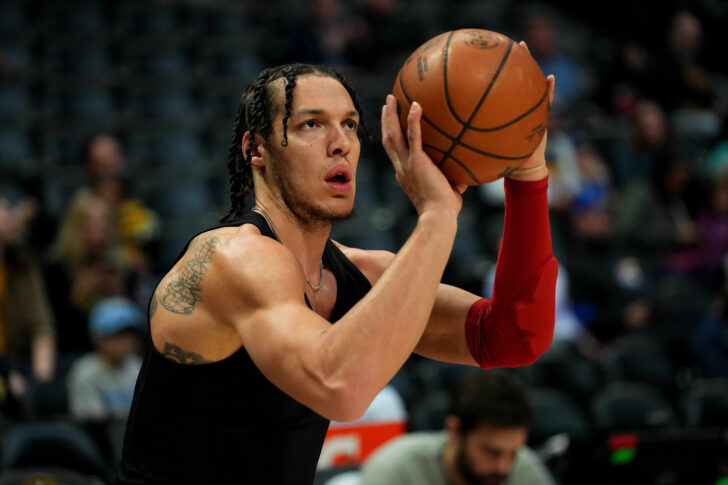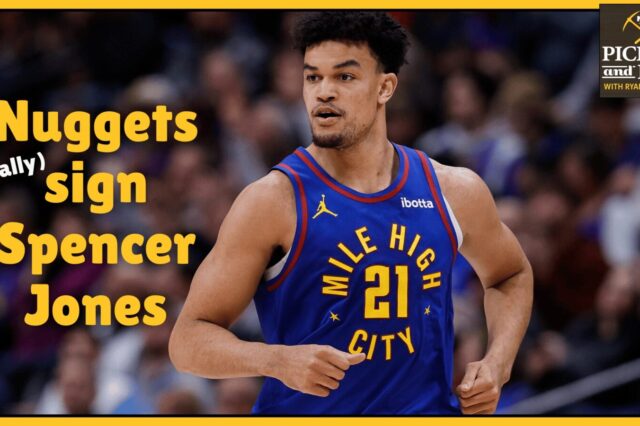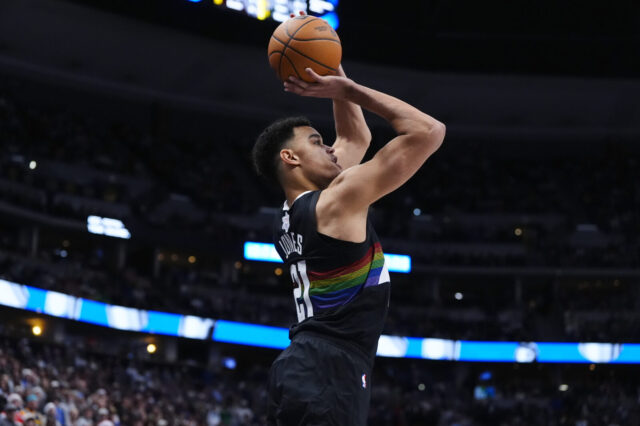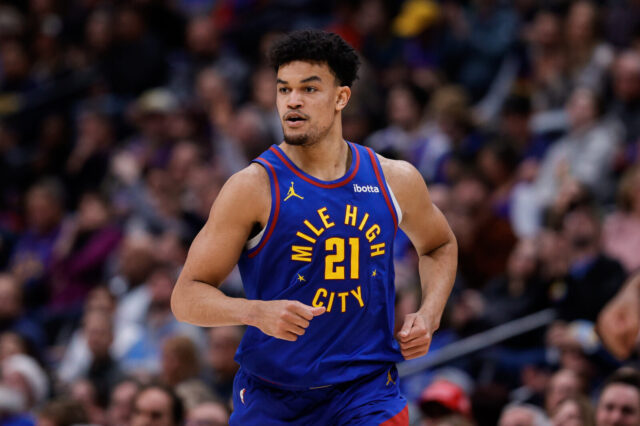Today marks 46 days until the beginning of the 2022-23 NBA season. In preparation for the most anticipated year in Denver Nuggets franchise history, Ryan Blackburn is asking and answering 20 burning questions facing the Nuggets prior to Media Day on Monday, September 26th. One question each weekday for the next four weeks.
Question 5: Is this the year Aaron Gordon gets to be a role player?
After the Denver Nuggets traded for Aaron Gordon in March of 2021, they reached the franchise’s own personal version of basketball nirvana.
All three of Jamal Murray, Michael Porter Jr., and Nikola Jokić averaged 20 points per game in the month of March that season. Jokić was captaining one of the best offenses in the league, and after a slow start by Murray and a slower start by Porter, the Nuggets were truly starting to find their groove.
After acquiring Gordon on March 24th, there was a brief moment when the defense, physicality, and demeanor of the team looked nearly as championship caliber as the offense.
Gordon arrived in Denver knowing that he was being asked to play a role for a playoff contender rather than playing the star. As a former fourth overall pick, Gordon had a certain pedigree as a high profile player. Even though he hadn’t quite lived up to that star billing, he was still a celebrity with appearances in the dunk contest and highlight reels all over the world. Nobody knew how he would adjust to a new role, though many suspected the transition would be smooth.
And boy, was the transition into role player buttery smooth for Aaron Gordon.
In the 25 games Gordon played during the 2020-21 season, the Nuggets went 19-6. The vast majority of those were without Murray, but Denver just kept chugging along. Jokić and Porter carried the scoring load, and Gordon averaged just 8.2 shots per game, down from the 11.7 shots he averaged with the Orlando Magic earlier in the season. Gordon instead focusing on doing the little things, learning the play calls, and being the best role player he could be.
In fact, Gordon was among seven Nuggets to average between 7.1 and 10.8 shots per game in the games following Murray’s injury: PJ Dozier, Will Barton, Gordon, Paul Millsap, Monte Morris, Austin Rivers, and Facu Campazzo were all in the same range. That stretch highlighted that Jokić and Porter could still handle most of the offensive responsibilities when surrounded by capable defensive personnel.
In the playoffs of each of the past two seasons though, Gordon’s weaknesses as a traditional scorer and playmaker have come to the forefront without Murray (and Porter in 2022) to fill that role. Jokić was good in his minutes, but Porter struggled in the second round in 2021, and Gordon couldn’t make up the difference to seriously challenge the Phoenix Suns or Golden State Warriors.
The Nuggets learned a lot from those experiences though. Gordon’s best role defensively has become more defined after spending thousands of minutes defending point guards and lead ball handlers. Against smaller players, Gordon struggled to stay attached and couldn’t bother those guards with his length. Players like Damian Lillard, Stephen Curry, Ja Morant, and others were ultimately defended by Austin Rivers rather than Gordon.
The bigger Gordon is best used defensively against big playmaking wings and forwards, players that often use their strength to generate separation. Gordon doesn’t give an inch in those matchups physically, which is the primary reason Denver acquired him in the first place. Instead of Gordon defending small guards, newcomers Bruce Brown and Kentavious Caldwell-Pope, along with Jamal Murray and Bones Hyland, will be shouldering those assignments.
Playing Gordon more frequently against small forwards and power forwards will often place him in more help situations off-ball. With Jeff Green starting in place of Porter, and Monte Morris and Will Barton often in the starting unit, Gordon was defending on-ball way too much. Now, Gordon has an opportunity to excel as a help defender, which should elevate Denver’s entire defensive scheme built around Jokić.
Offensively, Gordon’s role is about to shift in a major way. He averaged 11.1 shots per game during the 2021-22 season and ended up being Denver’s second leading scorer at 15.0 points per game. With Murray and Porter returning, Gordon’s shot numbers will almost certainly go down. With Bones Hyland growing into a larger role, Gordon may end up taking the fifth or sixth most shots per game on the team, depending on how involved Caldwell-Pope gets on dribble handoffs and screening actions.
The great news for Denver: limiting Gordon’s overall shot attempts will allow Denver to feature him in the best ways possible. Gordon averaged the third most possessions per game on cuts among non-bigs, according to Synergy. He also averaged a solid number of transition possessions and got on the glass for offensive rebounds, dirty work plays mostly reserved for role players.
Another area where Gordon will have to focus in: corner threes. He shot 34.9% on corner threes last season, but if that could jump to 38% or even 40%, the Nuggets will be unstoppable offensively. While Gordon will still get the occasional post touch or isolation to satiate those desires, Denver will have other players offensively where those 1-on-1 opportunities would be better served.
There’s a chance that Denver’s starting lineup has the best net rating in the NBA next season. Jokić, Murray, and Porter will carry the offense, but the difference makers will be Caldwell-Pope and Gordon on the defensive end. Caldwell-Pope will defend most primary ball handlers, but Gordon will get opportunities too. He’s a player that Michael Malone will enjoy deploying in different defensive situations. Gordon has an opportunity to become one of the more impactful defensive forwards in the world if he wants to be. Because of Denver’s offensive firepower around him, he should have the energy necessary to fill that role too.
There may be scenarios where Gordon isn’t on the court in different closing lineups though. Porter makes as much sense as a stretch power forward in closing minutes as he does a tall small forward, perhaps more so. Bruce Brown will push for minutes as an additional guard defender too, one that Malone may rely heavily upon at different moments. If a team Denver faces is heavily guard laden and doesn’t have a forward for Gordon to match up with, perhaps he doesn’t close that game. Golden State and Phoenix come to mind, as do Memphis and Portland.
Still, the best version of Gordon is also an essential one for Denver’s most important lineups. He’s the key to Denver’s success against the Clippers and Mavericks. If the Nuggets are lucky enough to make the NBA Finals and face the Milwaukee Bucks, Boston Celtics, Miami Heat, or Brooklyn Nets, that means matchups with Giannis Antetokounmpo, Jayson Tatum, Jimmy Butler, or Kevin Durant. Gordon is the lynchpin of those defensive game plans, just as Andrew Wiggins was in Golden State’s playoff run.
Though the scoring numbers will be down, next season could be a career year for Gordon in the impact numbers that matter. If he embraces that change and becomes the best defensive minded role player he can be, the Nuggets will be well positioned to take the NBA by storm. After all, it’s the role the Nuggets envisioned for him 18 months ago.
Time for the payoff.



